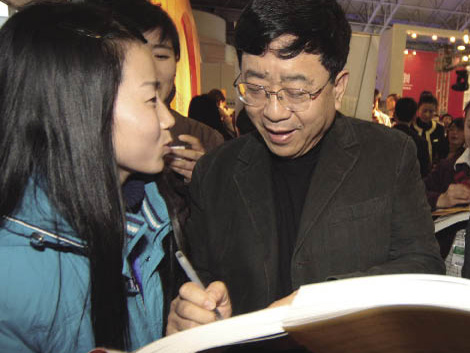| Bestseller Lists: Imprints Left by Time
By staff reporter Lu Rucai
"You are what you read," goes a Western saying. From the bestseller lists of the last decade, it is easy to trace the life of modern Chinese people.
Recently a list of bestsellers of the last ten years aroused heated discussions. From celebrities' biographies a decade ago, to contemporary titles on how to live healthily, the changing nature of bestsellers reflects the shifts in Chinese life.
Famous Lives
In 1997 the bestsellers list belonged to celebrity authors. Ni Ping, a famous anchor on CCTV, published her autobiography Rizi, or Days, which notched up sales of more than a million. Hosting an entertaining program with an audience rating of 18 percent, Ni had influence over 200 million viewers. Readers found out from the autobiography that the star was also a common person who had the same problems as everyone. In her book, Ni told people that she wanted to live a common life, and expressed her views on life, marriage and family, which made readers like her even more and drove her career to new heights.
Ni's successor on the program, Yang Lan, was another best-selling author that year. As an anchor for four years and a Golden Microphone winner, Yang left China for the US in her heyday. After graduating from Columbia University in 1997, she began to make her own TV programs. Her book Pinghai Linfeng, or Feeling Wind by Sea, was a collection of essays recording her experiences working in television and overseas. She shared love stories as well as her views on life. The book achieved instant success, selling over 500,000 copies in 1997. Facing Life with Smiles, by well-known comic actor Jiang Kun, was also a hit that year.
All the bestselling authors the following year were famous people in different fields, like Yu Qiuyu and An Dun, two masters in cultural circles.
 |
|
Yu Qiuyu and his fans. |
Ever since CCTV anchor Zhao Zhongxiang published Suiyue Suixiang, or Random Notes of Years, back in 1995, the advantage of publishing works by people already famous has been widely recognized by publishers. At a time when the Internet was not yet popular, traditional media, especially TV, was the main channel through which people acquired information. So it was no surprise that TV anchors were able to become stars of the publishing industry. The public wanted to know what celebrities' lives were like, so star authors' books were guaranteed sales in those years.
But the fad was over soon. Now bestsellers are created on the Internet. Even though Yang Lan now has her own company and is even more famous than 10 years ago, she would now find it much harder to achieve the same publishing success. Information on stars is now just a click of a mouse away.
Helping Kids Achieve
Guidebooks for parents are perennial favorites amongst China's readers. In 1998, The Learning Revolution, co-written by American educator Jeannette Vos and New Zealander Gordon Dryden, was listed at the top of the bestsellers. It was reprinted nine times in China, and sold around 10 million copies. It introduced learning methods and new views highly praised by teachers and parents. Clever Company, the book's promoter, bought prime time space on CCTV and invited famous director Xie Jin to be in the advertisement. "Reading this book can help us change the life of our kids," the elderly and highly respected director said. Both these advertisements and parents' enthusiasm for books that might help their children be successful contributed to huge sales. The book broke a Chinese record by selling 250,000 copies in one day.
In 1999 the number of Chinese youngsters attending college started climbing sharply, reaching 1,596,800 students that year, some 513,200 more than the previous year's intake. Meanwhile studying abroad became increasingly popular as well, and parents and students became concerned with gaining places in America's Ivy League universities. In 2000, Harvard Girl Liu Yiting became the year's bestseller. Her parents' divorce didn't have a negative affect on this girl, who was recruited by Harvard and drew much attention from other parents. This book has been reprinted over 70 times and has sold more than 2 million copies. The book market quickly filled with similar titles, including Enter Harvard Easily, and My Benben Enter Cambridge.
Even now these kinds of books can still be found on bestseller lists, although they don't sell quite so easily anymore. In a country where examination-oriented education dominates, parents still believe higher marks give their kids a higher social status.
|
